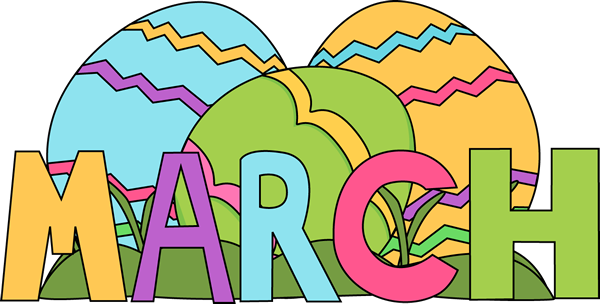
March heralds the beginning of spring so it is a month welcomed by almost everyone. It is also a busy month full of events and activities including Easter to keep everyone busy and entertained.
It is the month which brings us St David’s Day on the 1st of the month and St Patricks Day on the 17th. World Book Day is on the 3rd March. Celebrated in over 100 countries around the globe it is a day which marks literacy and the wonder and enjoyment that come from the pages of a book. The 6th March is also Mothering Sunday when we remember Mums everywhere, whether they are still with us or not. The end of the month brings Easter when children enjoy chocolate eggs and treasure hunts and Christians remember the sacrifice of Jesus.
So across the month we have a range of activities and things for you to try with the children to recognise each of these days. We hope you have fun.
St David’s Day – 1st March
Tuesday 1st March is St David’s Day. St David (Dewi Sant) was a Celtic monk, abbot and bishop, who lived in the sixth century. He spread the word of Christianity across Wales. The most famous story about Saint David tells how he was preaching to a huge crowd and the ground is said to have risen up, so that he was standing on a hill and everyone had a better chance of hearing him. St David’s Day is commemorated by the wearing of daffodils or leeks. Both plants are traditionally regarded as national emblems. Why not try making a daffodil pinwheel by following our easy to follow guide, shown below. Not only are they ideal for celebrating St David’s Day but they also make beautiful gifts for Mother’s Day.
World Book Day – 3rd March
World Book Day celebrates authors, illustrators and books. It is the biggest celebration of its kind, designated by UNESCO as a worldwide celebration of books and reading. It is marked in over 100 countries all over the world. The main aim of World Book Day in the UK and Ireland is to encourage children to explore the pleasures of books and reading.
Mothering Sunday – 6th March
The roots of Mother’s Day go back as far as ancient Greece, where Greeks had an annual spring festival dedicated to the maternal Goddess; Rhea, mother of the Gods. However we all have Anna Jarvis to thank for the modern Mother’s Day celebrations. After the death of her own mother she began a campaign to have one day of the year set aside to recognise and appreciate the role of mothers. In 1914, US Congress granted her wish proclaiming Mother’s Day as a national holiday. Other countries followed suit by celebrating Mothers Day, though not necessarily by having a national holiday.
St Patricks Day – 17th March
Saint Patrick, the patron saint of Ireland, is said to have brought Christianity to Ireland. He was born in Wales somewhere around AD 385. Early stories about St Patrick claim that he was carried off by pirates and spent six years in slavery before escaping and training as a missionary. St. Patrick is most known for his driving the snakes from Ireland. It is said that St Patrick stood on a hill and using a drum he banged so hard that the noise hurt the ears of the snakes and they slithered into the sea to escape. Another legend says that the snakes resisted so St. Patrick then tricked them into entering a small box and cast them into the sea. Whichever legend you believe, it is true that Ireland has no snakes!
He died on 17th March in AD 461 and this day has since been commemorated as St. Patrick’s Day. St Patrick’s Day is marked by the wearing of shamrocks (a clover-like plant), the national emblem of both Northern Ireland and the Republic of Ireland. Why not test your hand with our St Patrick’s Day themed crossword below.
Good Friday – 25th March
Easter is the most important festival in the Christian calendar. It celebrates the resurrection of Jesus, three days after he was executed. The Easter story is at the heart of Christianity. Good Friday is the Friday before Easter Sunday. It commemorates the execution of Jesus by crucifixion. Some people believe Good Friday was originally called God’s Friday, which, over the years, became its present name.
Good Friday is a day of reflection in the Christian church. During special Good Friday services Christians remember Jesus’ suffering and death on the cross, and what this means for their faith. In some countries, there are Good Friday processions, or re-enactments of the Crucifixion.
Easter Sunday – 27th March
Easter Sunday marks Jesus’ resurrection. After Jesus was crucified on what we now call Good Friday, his body was taken down from the cross, and buried in a tomb. The tomb was guarded by Roman Soldiers and an enormous stone was put over the entrance, so that no-one could steal the body. Yet when Mary Magdalene visited the tomb on Easter Sunday she found that the stone had been moved, and that Jesus’ body had gone. Jesus appeared to his apostles for 40 days, giving many proofs that he was alive. Christians celebrate the resurrection of Jesus on this day in the belief that everybody will be resurrected.
The custom of giving eggs at Easter has long been associated with celebrating new life. Today, eggs come in all shapes and sizes and chocolate Easter eggs are given as gifts to children. We have designed an Easter Word Search full of words associated with Easter. We hope you enjoy playing it.
Originally written 1 March 2016